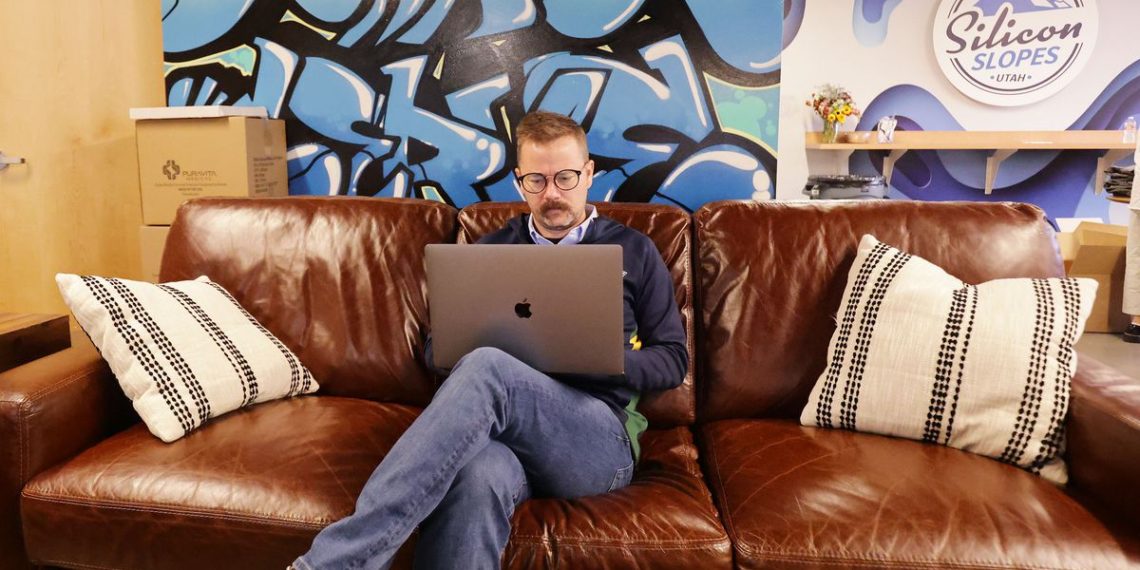The age of the Ping-Pong table, beanbag chair startup may be nearing its end in Utah.
In its place, Beehive State tech leaders say they are refocusing on people by offering family-centered benefits, estimable company culture and better management, according to many of the tech CEOs who presented Thursday during the second day of the Silicon Slopes Summit in Salt Lake City.
Cicero CEO Trent Kaufman presented data collected in partnership with BYU that showed that “what we have in Utah is an all-out talent war going on.”
With some of the lowest unemployment rates in the nation, retention going down and about half of employees actively looking for another job, “it is undoubtedly an employees’ market,” Kaufman said.
Besides money, better leadership — clear expectations and autonomy over micromanagement — was the thing the employees most cared about twice as much as anything else, according to the survey of 2,000 Silicon Slopes workers. More than half of them said that they were not receiving effective coaching or leadership training in their current roles.
“Don’t offer more perks like dry cleaning, climbing walls or kombucha bars. You can’t throw money at the problem,” Kaufman advised. “Give employees visionary leadership and the resources and autonomy to crush it.”
Jonathan Johnson, CEO of Overstock, who took over the company in 2019 when then-CEO Patrick Byrnes suddenly resigned and severed all ties, said the company made a mistake five years ago when it moved into Peace Coliseum, the company’s $100 million campus in Midvale — complete with on-site day care, an on-site medical clinic, a game room and even a green room to grow fresh food for the on-site dining area.
While it was easy to recruit employees, the perks wouldn’t make them stay or make business improve.
It was a “proxy for culture,” Johnson said. “Office space is not culture. Ping-Pong tables are not culture. Subsidized meals are not culture.”
Instead, he chose to build an entirely new company culture to “represent who we were and who we wanted to be.” The company offered a variety of paid family leave for most circumstances, an employee stock purchase plan, a generous 401(k) and eventually covering fertility treatments for employees who want them. As a result, he said, employee satisfaction has soared and so has the company’s market cap.
“Who knew doing good is good business?” he said, tongue in cheek.
Not Silicon Valley
Silicon Slopes CEO and President Clint Betts started off with vulnerability — admitting his worries. He told the audience of tech gurus that he did not want Silicon Slopes to become like Silicon Valley, allowing tech companies to excel at the expense of the employees and the surrounding community.
He’s concerned about the growing level of divisiveness and animosity in the state. And he’s worried Silicon Slopes could be contributing to the negativity.
“The only way we will continue to progress and thrive in this state is through love and understanding,” he said.
Utah Gov. Spencer Cox told Betts that the best way to ensure Silicon Slopes doesn’t become like Silicon Valley is to recognize the tension and identify the good and the bad in order to try to improve.
“What is it that makes Utah so successful?” he asked Betts. The answer? People come and they stay.
“We’re the fastest-growing state in the nation because we have the least amount of out-migration,” Cox said, adding that Utah also leads the nation in upward mobility.
But better tech doesn’t necessarily heal the divide in the community. In spite of Cox’s undeniable optimism and zest, he admitted that the hardest part of being governor has been that people have been isolated and lonely and learned to connect in unhealthy ways, including making life difficult for his family via social media. He admitted that his wife had deleted Facebook because of the online backlash of her husband’s position.
In the end, though, he said, “I feel like the luckiest guy in the world. … The best is yet to come.”
The new generation of startups
The summit also featured the finals of a fierce startup competition during which 10 teams pitched tech ventures to a board of investors.
The groups included companies that provided services like encrypting biomedical data to make it more accessible, creating searchability for certain features and packages when buying a car, and connecting college students to companies for projects and work while they’re still in school.
A contractor-based moving company called WeLift won the competition and received $250,000. The company, started by young married couple Sydnee Paul and Luke Nafrada, allows people who need help moving smaller amounts on short notice to hire the number of contracted movers they need for the time they need instead of paying the full price for a moving company to help with only a few items.
New horizons
During the conference, Gail Miller announced that the Larry H. Miller Group of Companies has made $5 billion in strategic changes in the past year, moving on from their most well-known business ventures.
“We’re turning our attention to new horizons,” Miller said during the summit.
She added that it’s important to know when a certain era is over and when it’s time to move on. These “new horizons,” she said, include diversifying the company’s portfolio, while being agile and using foresight.
Miller stated that one such move is the company’s purchase of Advanced Health Care Corporation in January, though she did not say whether the company would continue purchasing other health care companies.
“It’s through change and challenge that we find opportunity and growth,” Miller added.
Credit: Source link





















